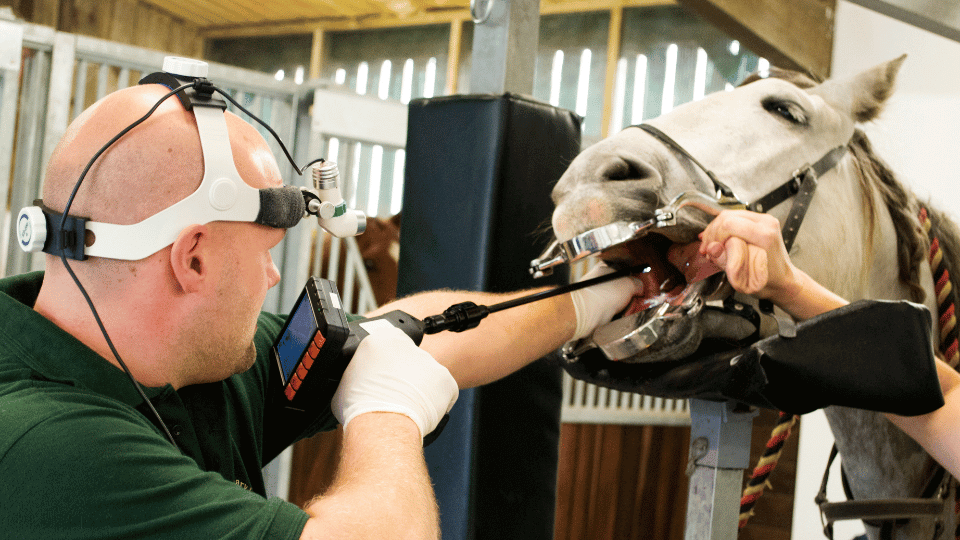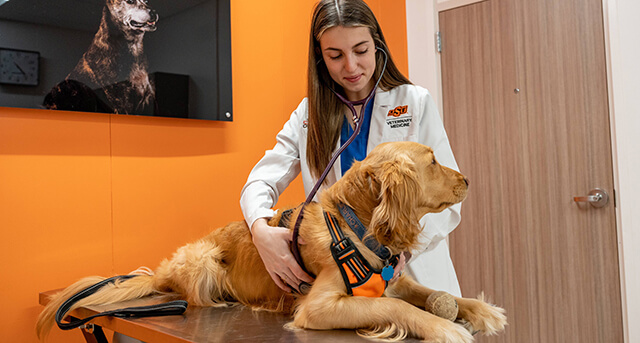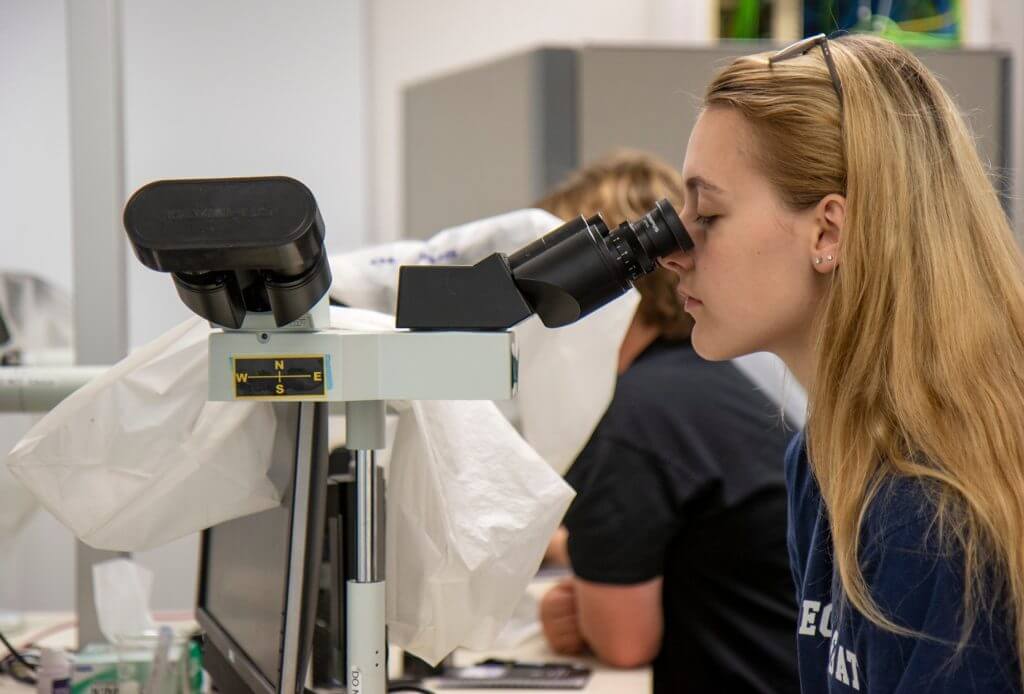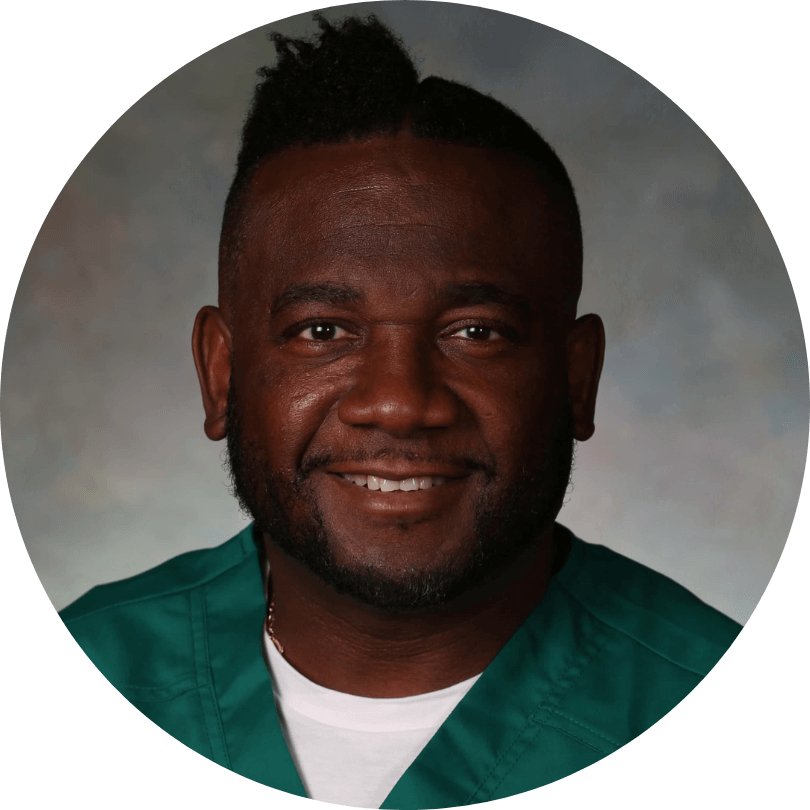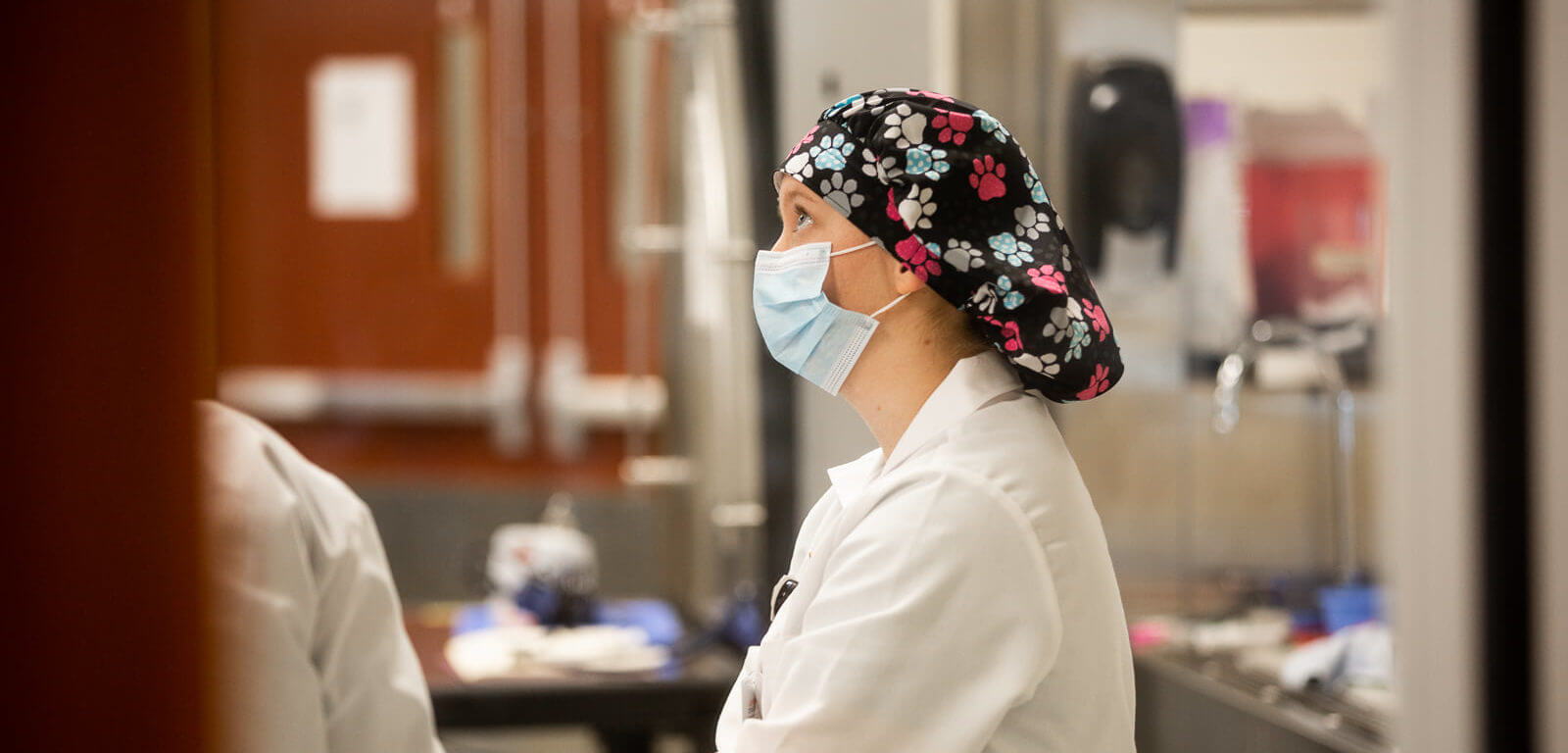


VetMed Pathways
VetMed Pathways aims to illuminate the endless pathways within the world of veterinary medicine and support and inspire the next generation of community leaders. Future veterinary professionals of all backgrounds and abilities can discover and nurture their passion for animals into a fulfilling life-long career.
Careers in Veterinary Medicine
Veterinary medicine is about putting your knowledge and compassion into practice. Preventing disease and healing animals is at the heart of what professionals in veterinary medicine do. But they also do so much more.
Unlimited Options
Veterinarians provide care for companion animals through private medical practices. They are also involved in promoting the health and welfare of farm animals, exotic animals, working animals, and those that need a healthy environment in which to thrive.
Animal Health
Many veterinarians are engaged in work at the intersection of both human and animal health. Their training can help them to detect and treat the outbreak of diseases that have the potential to make the jump from animals to humans.
At the Forefront
Every community needs veterinary professionals to provide animal health care, but veterinarians also do many other jobs. They make sure the nation’s food supply is safe, work to control the spread of diseases, and conduct research that helps both animals and humans.
The American Association of Veterinary Medical Colleges (AAVMC) is a nonprofit membership organization working to protect and improve the health and welfare of animals, people, and the environment by advancing academic veterinary medicine. Its members include veterinary medical colleges in the United States and Canada, departments of veterinary science, departments of comparative medicine, and international colleges of veterinary medicine. AAVMC and VetMed Pathways aim to illuminate the endless pathways within the world of veterinary medicine and support and inspire the next generation of community leaders.
Pathways
for You
Veterinary medicine is a well-respected profession because veterinarians make significant contributions to improving the health and wellbeing of the animals and people they serve. Veterinarians practice medicine that alleviates suffering, contributes to groundbreaking medical advancements, protects the environment, and makes the world a better, healthier place.
Veterinarians and Their Stories
Veterinary medicine is about putting your knowledge and compassion into practice. Preventing disease and healing animals is at the heart of what professionals in veterinary medicine do. But they also do so much more.
The Story of a Small Animal Veterinarian Dr. Vernard L. Hodges
Meet Dr. Vernard L. Hodges, a small animal veterinarian with a deep love for all creatures. Growing up on a farm in rural Georgia, he nurtured and cared for goats, cows, dogs, turtles, and many other pets. After exploring fish biology and aquatic science, his true passion for veterinary medicine was ignited, leading him to graduate with a DVM from Tuskegee University School of Veterinary Medicine. Today, Dr. Hodges continues to spread his love and dedication to animals, raising Koi on his fish farm and caring for his three dogs and son.
Meet Dr. Vernard L. Hodges, a compassionate small animal veterinarian with a profound love for all creatures. Growing up on a farm in rural Peach County, Georgia, he developed a special bond with the goats, cows, dogs, cats, turtles, and numerous other pets that filled his childhood. Spending countless hours nurturing and caring for them, Dr. Hodges knew from an early age that his life’s calling was to help and heal animals. After graduating from Peach County High School in 1988 and earning a degree in Fish Biology from Fort Valley State University in 1993, he set out on a journey to explore his passion for aquatic science and marine biology. Driven by his fascination for underwater life, he spent a summer working for the Agency for International Development in Nepal and India, developing an Aquaculture program to provide inexpensive protein to village residents through fish farming. Additionally, he participated in an Aquatic Internship at the University of Mississippi, hoping to follow in the footsteps of the renowned explorer Jacques Cousteau.
However, the true calling of Veterinary Medicine beckoned, and Dr. Hodges followed his heart to Tuskegee University School of Veterinary Medicine, where he graduated with a Doctor of Veterinary Medicine (DVM) degree in 1997. Embracing his lifelong passion, he dedicated his career to becoming a skilled small animal veterinarian. Today, Dr. Hodges continues to spread his love and dedication to animals, raising Koi on his fish farm in Peach County and providing expert care to pets in his practice. Alongside his son and three beloved dogs, he embodies the spirit of a true animal advocate, striving to make a positive impact on the lives of animals and their owners alike. With his wealth of experience and genuine affection for all creatures, Dr. Vernard L. Hodges is a remarkable veterinarian who touches hearts and changes lives with his commitment to the well-being of animals in his community.
The Story of a Avian Veterinarian Dr. Sharman Hoppes
Discover Dr. Sharman Hoppes, a dedicated avian veterinarian specializing in the health and well-being of birds. As a Diplomate of the American Board of Veterinary Practitioners in Avian Practice, she has become a leading expert in avian medicine and care. With her passion for feathered friends and years of experience, Dr. Hoppes continues to make a significant impact in the field of avian veterinary medicine.
Meet Dr. Sharman Hoppes, a compassionate avian veterinarian who devotes her expertise to the health and happiness of our feathered friends. As a Diplomate of the American Board of Veterinary Practitioners in Avian Practice, she is a top expert in avian medicine and care. With years of experience and a deep love for birds, Dr. Hoppes has become a trusted name in the field of avian veterinary medicine.
In her veterinary practice, Dr. Hoppes cares for a wide variety of birds, from colorful parrots to playful cockatiels and majestic raptors. She knows all about the unique needs and behaviors of different bird species, ensuring they receive the best possible care. Dr. Hoppes uses her knowledge and skills to diagnose and treat illnesses, provide preventive care, and even perform surgeries when needed. She also educates bird owners on how to keep their feathered companions healthy and happy, sharing her passion and knowledge to create a brighter future for avian health. Dr. Sharman Hoppes’s dedication to birds and her contributions to avian medicine make her a true advocate for these beautiful creatures, enriching the lives of both birds and their loving owners.
The Story of a Laboratory Veterinarian Dr. Martin J. Fettman
Discover Dr. Martin J. Fettman, a brilliant research veterinarian with a passion for advancing scientific knowledge. With years of experience and expertise in veterinary research, he has contributed significantly to the understanding of animal health and medicine. Dr. Fettman’s dedication to research has led to groundbreaking discoveries that continue to improve the lives of animals worldwide.
Meet Dr. Martin J. Fettman, a brilliant research veterinarian who is passionate about exploring the mysteries of animal health and medicine. With his years of experience and expertise in veterinary research, he has become a trusted leader in the field. Dr. Fettman’s tireless dedication to advancing scientific knowledge has led to groundbreaking discoveries that have had a positive impact on the well-being of animals worldwide.
In his research work, Dr. Fettman collaborates with other scientists and veterinarians to study various aspects of animal health. Whether it’s investigating new treatments for diseases, studying the effects of nutrition on animal well-being, or exploring ways to improve animal care, he uses his vast knowledge and skills to contribute valuable insights to the veterinary community. Dr. Fettman’s commitment to research and his passion for improving animal lives continue to drive him in his pursuit of innovative solutions and groundbreaking discoveries. Through his contributions to the field of veterinary research, Dr. Martin J. Fettman is making a lasting impact on the health and happiness of animals everywhere.
The Story of an Equine Veterinarian Dr. Cynthia Patterson
Discover Dr. Cynthia Patterson, a compassionate equine veterinarian who dedicates her expertise to the care and well-being of horses. With a strong love for these majestic animals, she has become a trusted expert in equine medicine and provides essential medical attention to keep horses healthy and happy. Dr. Patterson’s commitment to equine health and her years of experience make her a valued resource for horse owners, ensuring that their beloved companions receive the best care possible.
Meet Dr. Cynthia Patterson, a caring and experienced equine veterinarian, devoted to the health and happiness of horses. With a deep love for these majestic animals, she has become a trusted expert in equine medicine, providing essential care to keep horses thriving. Dr. Patterson’s journey as an equine veterinarian began with her fascination for horses from a young age, and she followed her passion by studying hard and gaining hands-on experience with these incredible creatures.
In her veterinary practice, Dr. Patterson works closely with horse owners to provide top-notch medical attention to their beloved companions. Whether it’s routine check-ups, treating injuries, or ensuring proper nutrition, she approaches every case with compassion and expertise. Dr. Patterson’s dedication to equine health extends beyond her practice, as she actively shares her knowledge with fellow veterinarians and horse enthusiasts. Through her contributions to the field of equine veterinary medicine, Dr. Cynthia Patterson continues to make a positive impact on the lives of horses and the people who cherish them.
The Story of a Large Animal Veterinarian Dr. Robert Callan
Discover Dr. Robert Callan, a dedicated large animal veterinarian whose passion lies in caring for big animals. With years of experience and expertise in large animal medicine, he is a trusted expert in the field. Dr. Callan’s commitment to the health and well-being of farm animals makes him a valuable resource for farmers and ranchers, ensuring that their livestock receive the best care possible.
Meet Dr. Robert Callan, a caring and experienced large animal veterinarian, specializing in the health and well-being of big animals. With a wealth of knowledge and expertise in the field of large animal medicine, he is a trusted expert who has dedicated his career to ensuring the welfare of farm animals. Dr. Callan’s passion for animals began at a young age, and he pursued his dream of becoming a veterinarian by studying hard and gaining hands-on experience working with a variety of large animals.
In his veterinary practice, Dr. Callan works closely with farmers and ranchers to provide top-notch medical care to their livestock. Whether it’s treating sick animals, performing routine check-ups, or providing preventive care, he approaches every case with compassion and skill. Dr. Callan’s dedication to the well-being of large animals extends beyond his practice, as he actively shares his knowledge with other veterinarians and students, ensuring that future generations of large animal veterinarians are equipped to provide excellent care to farm animals. His contributions to the field and unwavering commitment to large animal health make Dr. Robert Callan an exceptional and valuable asset to the veterinary community.
The Story of a Veterinarian for Pets in Need Dr. Kwane Stewart
Discover Dr. Kwane Stewart, a compassionate veterinarian dedicated to helping pets in need. As the founder of Project Street Vet, he provides free medical care to pets belonging to people experiencing homelessness. With over 20 years of experience, Dr. Stewart’s mission is to ensure that every pet, regardless of their owner’s circumstances, receives the care they deserve.
Meet Dr. Kwane Stewart, an experienced veterinarian who has turned his passion for animals into a life changing mission. After witnessing the heartbreaking number of pets surrendered due to financial hardship, he took his skills to the streets—offering free veterinary care to those who need it most. What started as a small act of kindness grew into Project Street Vet, a nonprofit now expanding across the country.
Dr. Stewart’s work has been chronicled in The Street Vet television series and earned him recognition as the 2023 CNN Hero of the Year. His efforts continue to bring hope and dignity to both pets and their owners, proving that love and care know no boundaries.
The Story of a Veterinarian Dedicated to Sustainability and Compassion in Dairy Farming Dr. Michelle Schack
Discover Dr. Michelle Schack, a passionate veterinarian dedicated to improving animal well-being on farms. As co-founder of DairyKind, she works alongside dairy farmers to bring practical, high-quality training to farm teams—helping ensure cows receive compassionate, quality care. With over a decade of experience in herd medicine, Dr. Schack is committed to building a more sustainable and compassionate future for agriculture.
Meet Dr. Michelle Schack, a passionate veterinarian who has turned her love for animals and education into a mission to elevate care on dairy farms. After graduating from UC Davis, she began working as a herd veterinarian in Arizona, building close relationships with farmers and helping ensure their animals receive the highest standard of care. In 2019, she co-founded DairyKind, a company focused on training farm teams in animal well-being practices that are practical, effective, and rooted in compassion. Through her clinical work, national speaking engagements, and viral social media platform DairyDoc (TikTok @DairyDoc; Instagram @Dairy.Doc; YouTube @Dairy_Doc), Dr. Schack is helping bridge the gap between farmers and the public, proving that kindness and science go hand in hand in modern dairy farming.

